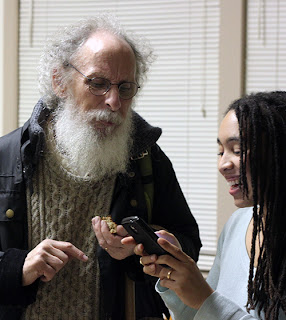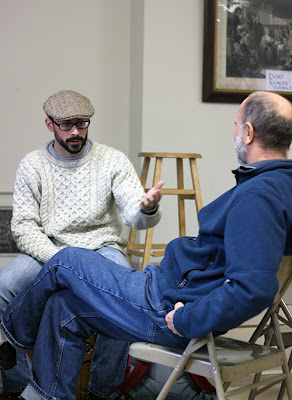
What if atheism were the most faithful
response to the life and message of Jesus? What if, rather than an
anomaly to be fixed or avoided, the felt experience of God's absence
were at the heart of the Christian faith? What if Jesus' sense of
abandonment by God on the cross were not merely a lamentable
necessity en route to the resurrection, but rather a central part of
what it means to live in the horrifying light of the gospel?
In his
2011 book, Insurrection,
Peter Rollins argues that belief in an externalized, objectivized
deity that "makes everything OK" is the path of religious
escapism. Instead, he urges us to strip away the comforting veil that
hides the naked truth from our eyes - the reality of pain, injustice
and deep existential anxiety. To doubt, Rollins argues, is divine -
because it is in the depths of despair that we can come into
communion with the crucified Jesus who, as he hangs on the cross,
cries out in desolation, "My God, my God, why have you forsaken
me?"
This
image of Jesus' utter brokenness on the cross is one that Rollins
returns to time and again as he drives home his message: There is a
god of our imagination that comforts us and makes our lives more
understandable, but this god is more fiction than reality. It is a
false savior, a security blanket that covers over our deepest
anxieties. This god that we create is a projection of our own need to
be observed and cared for, to live an existence that is ordered and
purposeful, to know that everything will be alright in the end.
Rollins
breathlessly invites us to cast aside these god-shaped idols that we
cling to in the name of religion. Rather than fleeing our moments
of anxiety and groundlessness, what if we allowed ourselves to feel
the radical abandonment by God that Jesus experienced on the cross?
What would happen if we confessed - first to ourselves, then to
others - that we do not understand the universe that we live in, that
it does not make sense to us? Paradoxically, Rollins insists that the
only way to truly encounter God is to fully experience the desolation
of God's absence.
Rollins
urges us to strip away all the anti-depressants that we heap on top
of the raw terror of human experience. Rather than wrapping ourselves
ever more deeply in the security blankets of conventional
religiosity, with its assurances of salvation "in the sky by and
by," a genuine encounter with the living God invites us to dwell
in the Desert of the Real. It is in this encounter that we experience
the unvarnished reality of our lives, uncushioned by hope of heaven,
fear of hell or illusions about a "nanny god" who will make
everything better soon. We stand most truly in the presence of Jesus
when we embrace the fullness of his suffering and his love for the
world as it is, not as the human imagination would have it be.
This
is particularly challenging for those of us whom God calls to
proclaim the gospel. What is the role of existential doubt, despair
and a felt sense of abandonment by God in this proclamation? Surely,
all of us have experienced this sense of groundlessness and loss in
our own lives. A sense of God's absence is certainly a regular part
of my spiritual experience. Yet, it is not the whole of it.
The
God of my own experience - and the God whom we encounter in Scripture
- is one who is both near to us and far away. Here is a God who
neither coddles us (depriving us of free will) nor abandons us
forever (depriving us of hope). Peter Rollins has written a brilliant
argument against the coddling, "safety blanket god." How do
I integrate this critique? What does it look like to fully embrace
the reality of the cross while witnessing to the life of the
Resurrection? How can I acknowledge my own experience of divine
abandonment while at the same time lifting up the life that lies on
the other side. The grain of wheat must die if it is to bear fruit -
but there is a joyous harvest awaiting us!

Rollins
would have us believe that the resurrection life is nothing more (or
less) than loving one another, dwelling in the love that makes God's
reality present. It is unclear to me whether Rollins believes that
God is an actor in history. For the most part, Rollins seems to view
God as an impersonal force (
agape
love) that we humans can
either choose to dwell in, or not. Because Rollins' focus is so
intensely on the abandonment that Jesus experienced on the cross, at
times I wondered whether he considers the experience of God's
presence and guidance to be real. Or is all sense of security,
groundedness and peace an illusion that separates us from real
engagement with life as it really is?
If I
had an opportunity to discuss these matters with Rollins, I feel
confident that he would give me well-considered answers that
demonstrate a balance between absolute despair and cheap theism that
denies the cross. Yet, as the book stands, I wonder whether Rollins
takes us a little too far from the reality of God's loving presence -
the divine personality and will that is not our own, yet fills our
lives with purpose, compassion and the pursuit of justice.
While
there are parts of Insurrection
that strike me as unbalanced, that is to be expected. A prophet does
not give a fair and balanced view of all sides of an issue. The
hallmark of prophetic witness is that it hits us exactly where we
need to be struck. It may not be fair,
but it provides the slap across the face that we need to wake up.
Peter Rollins is speaking to a decadent, self-satisfied Western
Church that has wallowed for far too long in a cheap gospel that
celebrates selfish joy and ignores the poor.

We
have sung too many cloying praise songs and heard too many peppy
sermons. We have whitewashed our own experience of spiritual
emptiness too many times. A church that is unwilling to face its own
insecurities and anxieties is incapable of truly embracing those on
the margins. This kind of church must shun those who cannot hide
their brokenness, because it cannot stand to see its own spiritual
condition reflected back.
Insurrection
urges us to look at ourselves in the mirror, perhaps for the first
time. It is a reminder that we must face the reality of our own
emptiness and anxiety. Another happy-clappy, "Jesus loves the
little children," cheap grace sermon will not get us to the
resurrection.
It is
only as we enter into the experience of emptiness, futility and death
that we encounter the beckoning reality of the resurrection. Rather
than sparing us from crucifixion, true resurrection is only to be
found as we pass through death into a deeper, truer existence. Peter
Rollins writes about this in a way that I find very compelling,
observing that even the resurrected Jesus bears the marks of his
torture on the cross.
Our
relationship with God and our fellow human beings looks very
different depending on which side of the cross we stand. Do we bear
witness to a post-crucifixion resurrection - or do we want to skip
the terror of the cross and dive straight into the after-party? Are
we truly ready to follow in Jesus' footsteps, taking on the suffering
and despair of the world and offering our lives into the hands of a
God who often seems absent? How do we bear the marks of the
crucifixion in our own bodies, even as we proclaim the living joy and
hope of the resurrection?




+139.jpg)


























+105.jpg)













